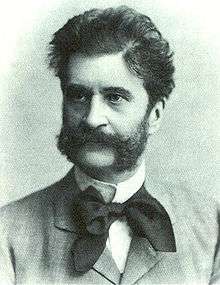Indigo und die vierzig Räuber
Indigo und die vierzig Räuber (Indigo and the Forty Thieves) is an operetta composed by Johann Strauss II to a German libretto by Maximilian Steiner based on the tale "Ali Baba and the Forty Thieves" from The Book of One Thousand and One Nights.
Performance history
It was first staged on 10 February 1871 at the Theater an der Wien in Vienna, Austria. It was initially granted a warm reception by Vienna's theatre-going public, but the press was more divided in opinion. Typical published reactions were: "It consists of dance music on which Strauss has overlaid text and characters ... A man of Strauss' reputation should never have allowed his name to be associated with such a venture ... It is an interesting production and is a foretaste of great things to come."
The work was successfully restaged in Paris in 1875 under the title Queen Indigo, then, rechristened A Night on the Bosphorus, it was presented in London in 1876.
Finally, after Strauss' death, the operetta was entirely reworked in 1906 by Max Steiner and staged in Vienna under yet another title, The Thousand and One Nights, which is also the title of one of Strauss' waltzes ("Tausend und eine Nacht", op. 346) of which the melodies were drawn from the stage work.
Max Schönherr later reworked the ballet music from this work into a concert piece,[1] and this version has been recorded.
Roles
| Role |
Voice type |
Premiere Cast, 10 February 1871
(Conductor: Johann Strauss II) |
|---|
| Janio |
tenor |
Albin Swoboda, Sr. |
| Indigo |
tenor |
Carl Matthias Rott |
| Ali Baba |
tenor |
Jani Szika |
| Romadour |
baritone |
Carl Adolf Friese |
| Fantasca |
soprano |
Marie Geistinger |
| Piastrella |
soprano |
Franziska Mellin |
| Empress |
soprano |
|
References
Notes
Sources
- Casaglia, Gherardo (2005).[http://www.amadeusonline.net/almanacco?r=&alm_giorno=10&alm_mese=02&alm_anno=1871&alm_testo=Indigo "Indigo, 10 February 1871"]. Almanacco Amadeus (Italian).
|
|---|
|
| Operettas | |
|---|
|
| Waltzes |
- Sinngedichte, Op. 1 (1844)
- Gunstwerber, Op. 4 (1844)
- Sträußchen, Op. 15 (1846)
- Klange aus der Walachei, Op. 50 (1850)
- Frohsinns-Spenden, Op. 73 (1850)
- Lava-Ströme, Op. 74 (1850)
- Rhadamantus-Klänge, Op. 94 (1851)
- Idyllen, Op. 95 (1851)
- Mephistos Höllenrufe, Op. 101 (1851)
- Liebeslieder, Op. 114 (1852)
- Phönix-Schwingen, Op. 125 (1853)
- Novellen, Op. 146 (1854)
- Nachtfalter, Op. 157 (1855)
- Glossen, Op. 163 (1855)
- Man lebt nur einmal!, Op. 167 (1855)
- Abschieds-Rufe, Op. 179 (1856)
- Phänomene, Op. 193 (1857)
- Abschied von St. Petersburg, Op. 210 (1858)
- Hell und voll, Op. 216 (1859)
- Promotionen, Op. 221 (1859)
- Accelerationen, Op. 234 (1860)
- Immer heiterer, Op. 235 (1860)
- Grillenbanner, Op. 247 (1861)
- Klangfiguren, Op. 251, (1861)
- Dividenden, Op. 252
- Karnevalsbotschafter, Op. 270 (1862)
- Leitartikel, Op. 273 (1863)
- Morgenblätter, Op. 279 (1863)
- Studentenlust, Op. 285 (1864)
- Aus den Bergen, Op. 292 (1864)
- Bürgersinn, Op. 295 (1865)
- Flugschriften, Op. 300 (1865)
- Wiener Bonbons, Op. 307 (1866)
- An der schönen blauen Donau, Op. 314 (1867)
- Künstlerleben, Op. 316 (1867)
- Die Publicisten, Op. 321 (1868)
- G'schichten aus dem Wienerwald, Op. 325 (1868)
- Illustrationen, Op. 331 (1869)
- Wein, Weib und Gesang, Op. 333 (1869)
- Freuet Euch des Lebens, Op. 340 (1870)
- Neu Wien, Op. 342 (1870)
- Tausend und eine Nacht, Op. 346 (1871)
- Wiener Blut (waltz), Op. 354 (1873)
- Carnevalsbilder, Op. 357 (1873)
- Bei uns Z'haus, Op. 361 (1873)
- Wo die Zitronen blühen, Op. 364 (1874)
- Du und du, Op. 367 (1874)
- Cagliostro-Walzer, Op. 370 (1875)
- O schöner Mai!, Op. 375 (1877)
- Rosen aus dem Süden, Op. 388 (1880)
- Nordseebilder, Op. 390 (1880)
- Kuss-Walzer, Op. 400 (1881)
- Frühlingsstimmen, Op. 410 (1883)
- Lagunen-Walzer, Op. 411 (1883)
- Schatz-Walzer, Op. 418 (1885)
- Wiener Frauen, Op. 423 (1886)
- Donauweibchen, Op. 427 (1887)
- Kaiser-Jubiläum-Jubelwalzer, Op. 434 (1888)
- Kaiser-Walzer, Op. 437 (1888)
- Rathausball-Tänze, Op. 438 (1890)
- Gross-Wien, Op. 440 (1891)
- Seid umschlungen, Millionen!, Op. 443 (1892)
- Trau, schau, wem!, Op. 463 (1895)
- Farewell to America
|
|---|
|
| Polkas |
- Herzenslust, Op. 3
- Explosions-Polka, Op. 43
- Veilchen, Op. 132
- Tritsch-Tratsch-Polka, Op. 214 (1858)
- Demolirer, Op. 269 (1862)
- Vergnügungszug, Op. 281 (1864)
- 'S gibt nur a Kaiserstadt, 's gibt nur a Wien!, Op. 291
- Lob der Frauen, Op. 315
- Postillon D'Amour, Op. 317 (1867)
- Leichtes Blut, Op. 319 (1867)
- Figaro-Polka, Op. 320 (1867)
- Ein Herz, ein Sinn!, Op. 323
- Freikugeln, Op. 326 (1868)
- Éljen a Magyar!, Op. 332
- Im Krapfenwald'l, Op. 336 (1869)
- Die Bajadere, Op. 351
- Vom Donaustrande, Op. 358
- Bitte schön!, Op. 372 (1875)
- Auf der Jagd, Op. 373 (1875)
- Banditen-Galopp, Op. 378 (1877)
- Waldine, Op. 385 (1879)
- Neue Pizzicato Polka, Op. 449
|
|---|
|
| Marches | |
|---|
|
| Quadrille | |
|---|
|
| Other | |
|---|
|
| Family | |
|---|
|
| In media | |
|---|
